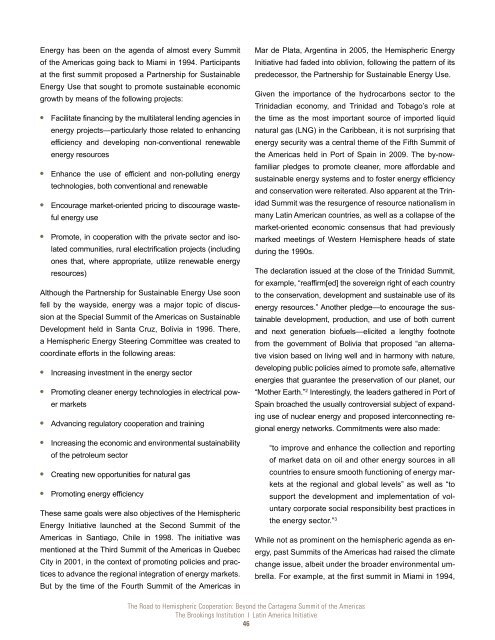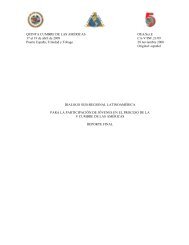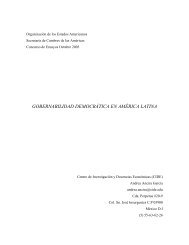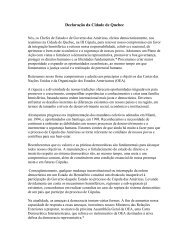The Road to Hemispheric Cooperation: Beyond the Cartagena
The Road to Hemispheric Cooperation: Beyond the Cartagena
The Road to Hemispheric Cooperation: Beyond the Cartagena
You also want an ePaper? Increase the reach of your titles
YUMPU automatically turns print PDFs into web optimized ePapers that Google loves.
Energy has been on <strong>the</strong> agenda of almost every Summit<br />
of <strong>the</strong> Americas going back <strong>to</strong> Miami in 1994. Participants<br />
at <strong>the</strong> first summit proposed a Partnership for Sustainable<br />
Energy Use that sought <strong>to</strong> promote sustainable economic<br />
growth by means of <strong>the</strong> following projects:<br />
●● Facilitate financing by <strong>the</strong> multilateral lending agencies in<br />
energy projects—particularly those related <strong>to</strong> enhancing<br />
efficiency and developing non-conventional renewable<br />
energy resources<br />
●● Enhance <strong>the</strong> use of efficient and non-polluting energy<br />
technologies, both conventional and renewable<br />
●● Encourage market-oriented pricing <strong>to</strong> discourage wasteful<br />
energy use<br />
●● Promote, in cooperation with <strong>the</strong> private sec<strong>to</strong>r and isolated<br />
communities, rural electrification projects (including<br />
ones that, where appropriate, utilize renewable energy<br />
resources)<br />
Although <strong>the</strong> Partnership for Sustainable Energy Use soon<br />
fell by <strong>the</strong> wayside, energy was a major <strong>to</strong>pic of discussion<br />
at <strong>the</strong> Special Summit of <strong>the</strong> Americas on Sustainable<br />
Development held in Santa Cruz, Bolivia in 1996. <strong>The</strong>re,<br />
a <strong>Hemispheric</strong> Energy Steering Committee was created <strong>to</strong><br />
coordinate efforts in <strong>the</strong> following areas:<br />
●● Increasing investment in <strong>the</strong> energy sec<strong>to</strong>r<br />
●● Promoting cleaner energy technologies in electrical pow-<br />
er markets<br />
●● Advancing regula<strong>to</strong>ry cooperation and training<br />
●● Increasing <strong>the</strong> economic and environmental sustainability<br />
of <strong>the</strong> petroleum sec<strong>to</strong>r<br />
●● Creating new opportunities for natural gas<br />
●● Promoting energy efficiency<br />
<strong>The</strong>se same goals were also objectives of <strong>the</strong> <strong>Hemispheric</strong><br />
Energy Initiative launched at <strong>the</strong> Second Summit of <strong>the</strong><br />
Americas in Santiago, Chile in 1998. <strong>The</strong> initiative was<br />
mentioned at <strong>the</strong> Third Summit of <strong>the</strong> Americas in Quebec<br />
City in 2001, in <strong>the</strong> context of promoting policies and practices<br />
<strong>to</strong> advance <strong>the</strong> regional integration of energy markets.<br />
But by <strong>the</strong> time of <strong>the</strong> Fourth Summit of <strong>the</strong> Americas in<br />
Mar de Plata, Argentina in 2005, <strong>the</strong> <strong>Hemispheric</strong> Energy<br />
Initiative had faded in<strong>to</strong> oblivion, following <strong>the</strong> pattern of its<br />
predecessor, <strong>the</strong> Partnership for Sustainable Energy Use.<br />
Given <strong>the</strong> importance of <strong>the</strong> hydrocarbons sec<strong>to</strong>r <strong>to</strong> <strong>the</strong><br />
Trinidadian economy, and Trinidad and Tobago’s role at<br />
<strong>the</strong> time as <strong>the</strong> most important source of imported liquid<br />
natural gas (LNG) in <strong>the</strong> Caribbean, it is not surprising that<br />
energy security was a central <strong>the</strong>me of <strong>the</strong> Fifth Summit of<br />
<strong>the</strong> Americas held in Port of Spain in 2009. <strong>The</strong> by-nowfamiliar<br />
pledges <strong>to</strong> promote cleaner, more affordable and<br />
sustainable energy systems and <strong>to</strong> foster energy efficiency<br />
and conservation were reiterated. Also apparent at <strong>the</strong> Trinidad<br />
Summit was <strong>the</strong> resurgence of resource nationalism in<br />
many Latin American countries, as well as a collapse of <strong>the</strong><br />
market-oriented economic consensus that had previously<br />
marked meetings of Western Hemisphere heads of state<br />
during <strong>the</strong> 1990s.<br />
<strong>The</strong> declaration issued at <strong>the</strong> close of <strong>the</strong> Trinidad Summit,<br />
for example, “reaffirm[ed] <strong>the</strong> sovereign right of each country<br />
<strong>to</strong> <strong>the</strong> conservation, development and sustainable use of its<br />
energy resources.” Ano<strong>the</strong>r pledge—<strong>to</strong> encourage <strong>the</strong> sustainable<br />
development, production, and use of both current<br />
and next generation biofuels—elicited a lengthy footnote<br />
from <strong>the</strong> government of Bolivia that proposed “an alternative<br />
vision based on living well and in harmony with nature,<br />
developing public policies aimed <strong>to</strong> promote safe, alternative<br />
energies that guarantee <strong>the</strong> preservation of our planet, our<br />
“Mo<strong>the</strong>r Earth.” 2 Interestingly, <strong>the</strong> leaders ga<strong>the</strong>red in Port of<br />
Spain broached <strong>the</strong> usually controversial subject of expanding<br />
use of nuclear energy and proposed interconnecting regional<br />
energy networks. Commitments were also made:<br />
“<strong>to</strong> improve and enhance <strong>the</strong> collection and reporting<br />
of market data on oil and o<strong>the</strong>r energy sources in all<br />
countries <strong>to</strong> ensure smooth functioning of energy markets<br />
at <strong>the</strong> regional and global levels” as well as “<strong>to</strong><br />
support <strong>the</strong> development and implementation of voluntary<br />
corporate social responsibility best practices in<br />
<strong>the</strong> energy sec<strong>to</strong>r.” 3<br />
While not as prominent on <strong>the</strong> hemispheric agenda as energy,<br />
past Summits of <strong>the</strong> Americas had raised <strong>the</strong> climate<br />
change issue, albeit under <strong>the</strong> broader environmental umbrella.<br />
For example, at <strong>the</strong> first summit in Miami in 1994,<br />
<strong>The</strong> <strong>Road</strong> <strong>to</strong> <strong>Hemispheric</strong> <strong>Cooperation</strong>: <strong>Beyond</strong> <strong>the</strong> <strong>Cartagena</strong> Summit of <strong>the</strong> Americas<br />
<strong>The</strong> Brookings Institution ❘ Latin America Initiative<br />
46








